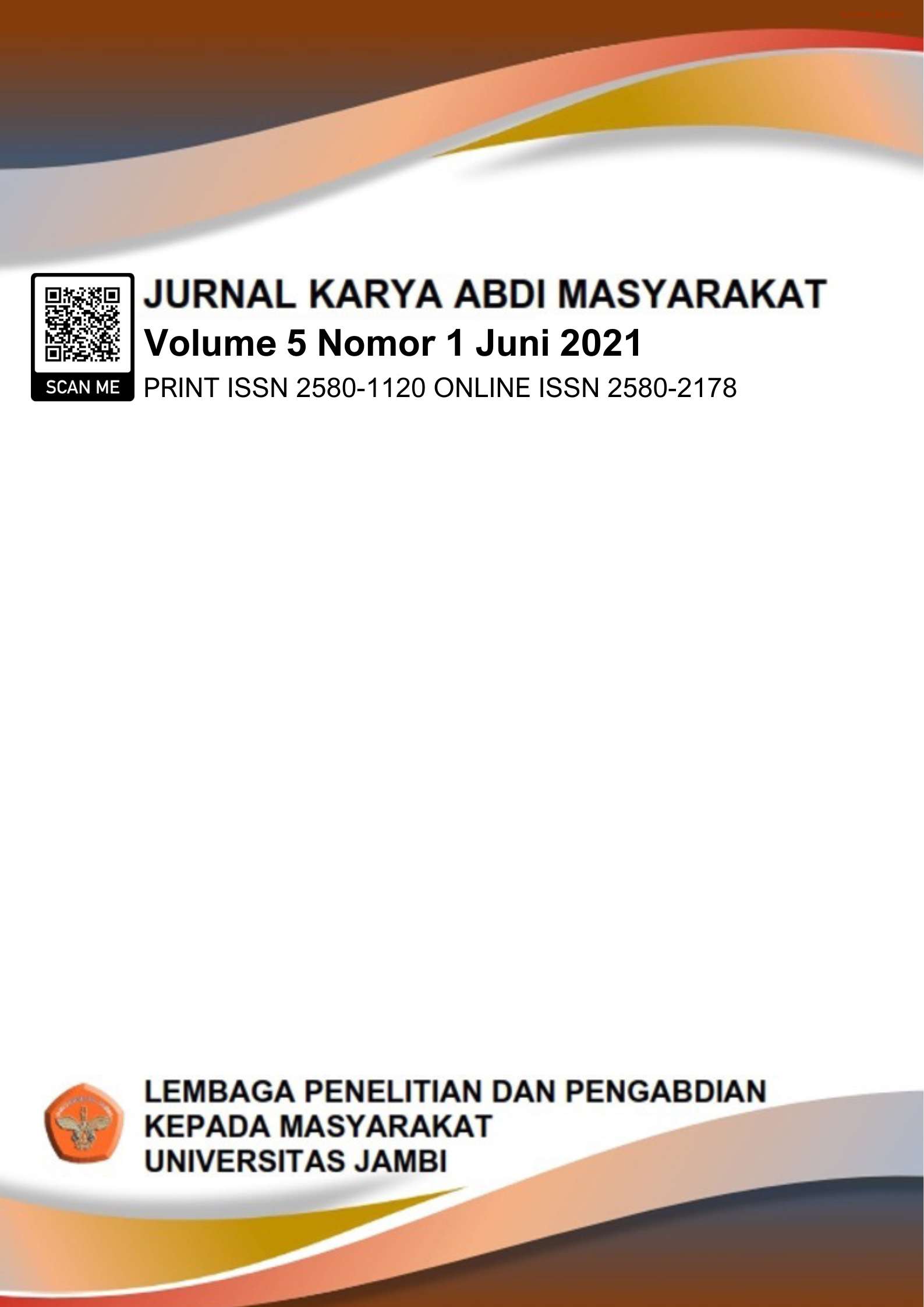Memilih Masalah Untuk Penelitian Tindakan Kelas: Bahan kajian untuk pelatihan Guru menyusun Laporan hasil PTK
DOI:
https://doi.org/10.22437/jkam.v5i1.13805Abstract
Tujuan paper ini adalah dalam rangka meningkatkan kemampuan guru dalam menyusun proposal, pelaksanaan penelitian dan penyusunan laporan hasil PTK untuk dijadikan sebagai karya publikasi ilmiah untuk memperoleh angka kredit maksimal. Metode yang digunakan adalah deskriptif dan meru- pakan expost-facto karena dilakukan setelah selesai melakukan kegiatan Pelatihan Peningkatan Kom- petensi Guru Dalam Menyusun Laporan Hasil PTK Pada Guru SMAN-1 Kabupaten Batanghari, yang dilaksanakan tanggal 04 Agustus 2020-05 September 2020. Data diperoleh dari sumber primer yaitu guru yang berjumlah 33 responden. Instrumen pengumpul data yang digunakan adalah angket, dan an- alisis data menggunakan teknik prosentase. Hasil yang dicapai: Pertama, dalam memilih masalah untuk PTK, pilihlah masalah yang cukup besar dan strategis, pilihlah masalah yang disenangi, dan pilihlah masalah yang riil dan problematik, agar pemecahan masalah akan memberi manfaat yang besar dan jelas. Kedua, dalam pelaksanaan PTK dianjurkan untuk berkolaborasi (collaborative action reseach) agar ada kesempatan bertukar fikiran dengan guru mitra dari mata pelajaran sejenis atau guru lain yang lebih senior dalam menentukan masalah. Implikasi kegiatan adalah; (1) Kegiatan Pelatihan Peningkatan Kompetensi Guru Dalam Menyusun KTI Hasil PTK perlu terus diupayakan, karena hampir semua guru membutuhkan kemampuan tersebut terutama untuk menunjang karier dan peningkatan kesejahteraan yaitu kenaikan pangkat. (2) Pemerintah daerah perlu menganggarkan dana untuk pelaksanaan kegiatan Penelitian Tindakan Kelas (PTK) bagi guru yang berasal dari APBD Provinsi atau Kabupaten/Kota. (3) Dosen di LPTK Unniversitas Jambi perlu terus mengupayakan kegiatan pembimbingan PTK baik me- lalui program penelitian kolaboratif Dosen-Guru.
Downloads
Downloads
Published
How to Cite
Issue
Section
License
Copyright (c) 2021 Ekawarna, M. Salam, Yusdi Anra

This work is licensed under a Creative Commons Attribution-NonCommercial-ShareAlike 4.0 International License.
Please find the rights and licenses in Jurnal Jurnal Karya Abdi Masyarakat (JKAM).
- License
The non-commercial use of the article will be governed by the Creative Commons Attribution license as currently displayed on Creative Commons Attribution 4.0 International License.
- Authors Warranties
The author warrants that the article is original, written by stated author(s), has not been published before, contains no unlawful statements, does not infringe the rights of others, is subject to copyright that is vested exclusively in the author and free of any third party rights, and that any necessary written permissions to quote from other sources have been obtained by the author(s).
- User Rights
JKAM's spirit is to disseminate articles published are as free as possible. Under the Creative Commons license, JKAM permits users to copy, distribute, display, and perform the work for non-commercial purposes only. Users will also need to attribute authors and JKAM on distributing works in the journal.
- Rights of Authors
Authors retain the following rights:
- Copyright, and other proprietary rights relating to the article, such as patent rights,
- The right to use the substance of the article in future own works, including lectures and books,
- The right to reproduce the article for own purposes, provided the copies are not offered for sale,
- The right to self-archive the article.
- Co-Authorship
If the article was jointly prepared by other authors, the signatory of this form warrants that he/she has been authorized by all co-authors to sign this agreement on their behalf, and agrees to inform his/her co-authors of the terms of this agreement.
- Termination
This agreement can be terminated by the author or JKAM upon two months notice where the other party has materially breached this agreement and failed to remedy such breach within a month of being given the terminating party notice requesting such breach to be remedied. No breach or violation of this agreement will cause this agreement or any license granted in it to terminate automatically or affect the definition of JKAM.
- Royalties
This agreement entitles the author to no royalties or other fees. To such extent as legally permissible, the author waives his or her right to collect royalties relative to the article in respect of any use of the article by JKAM or its sublicensee.
- Miscellaneous
JKAM will publish the article (or have it published) in the journal if the articles editorial process is successfully completed and JKAM or its sublicensee has become obligated to have the article published. JKAM may conform the article to a style of punctuation, spelling, capitalization, referencing and usage that it deems appropriate. The author acknowledges that the article may be published so that it will be publicly accessible and such access will be free of charge for the readers.














